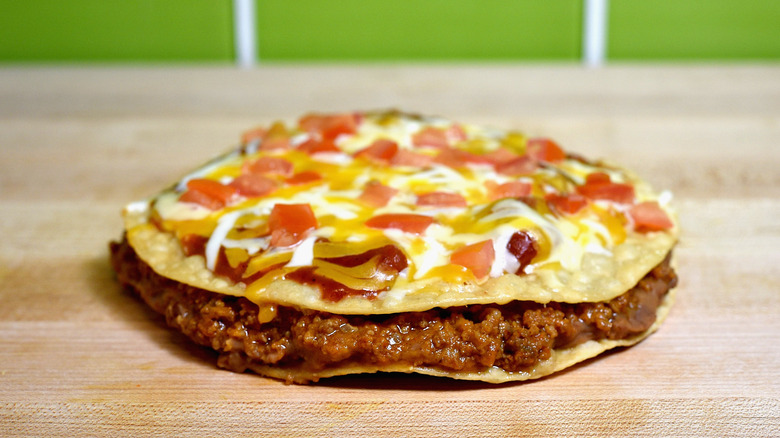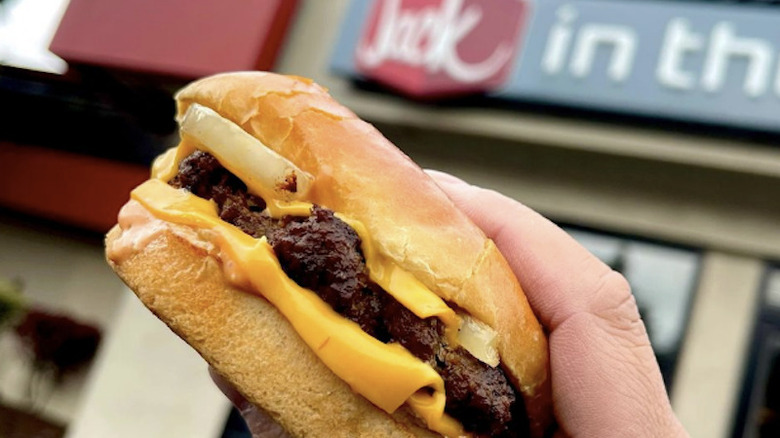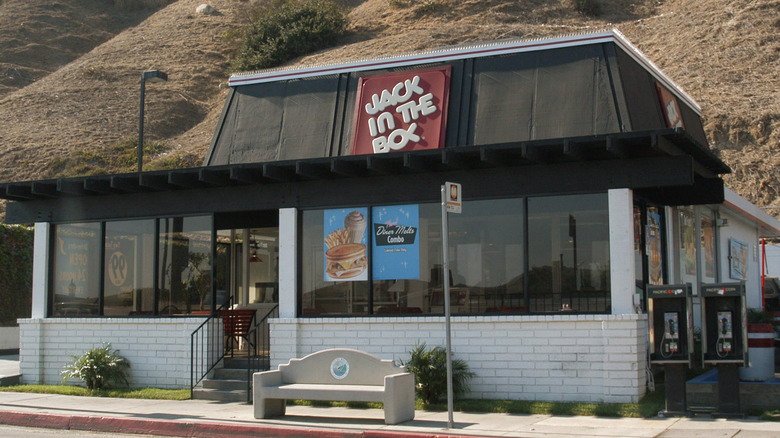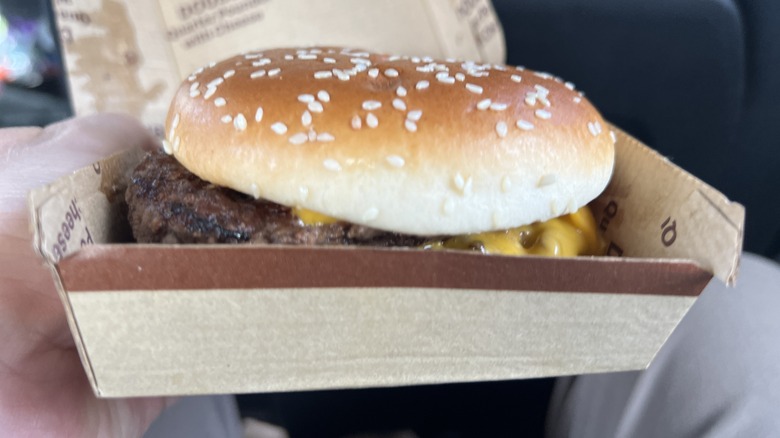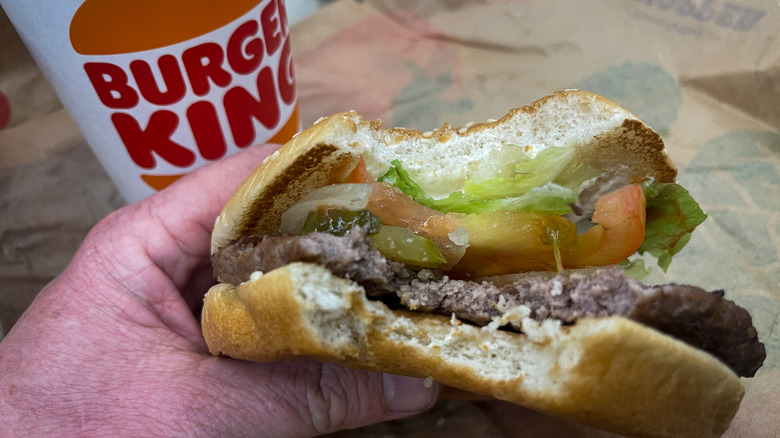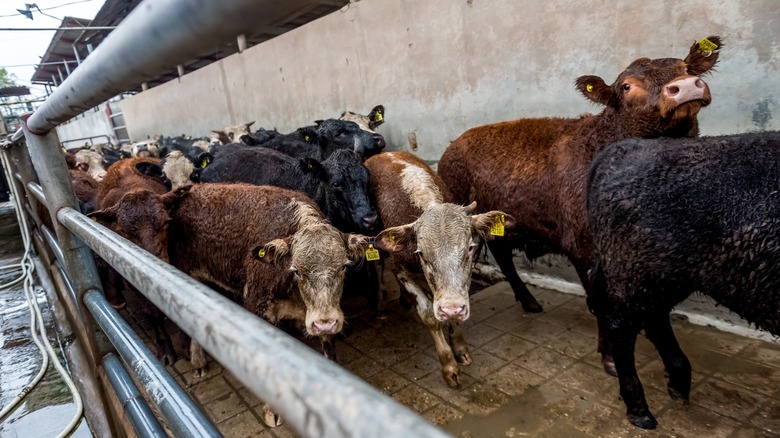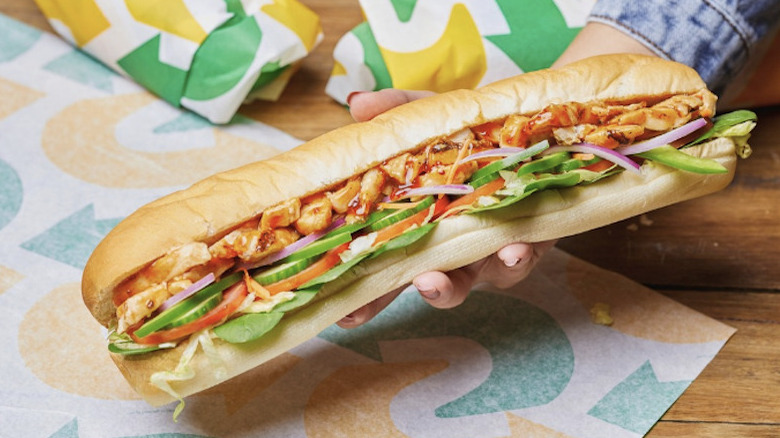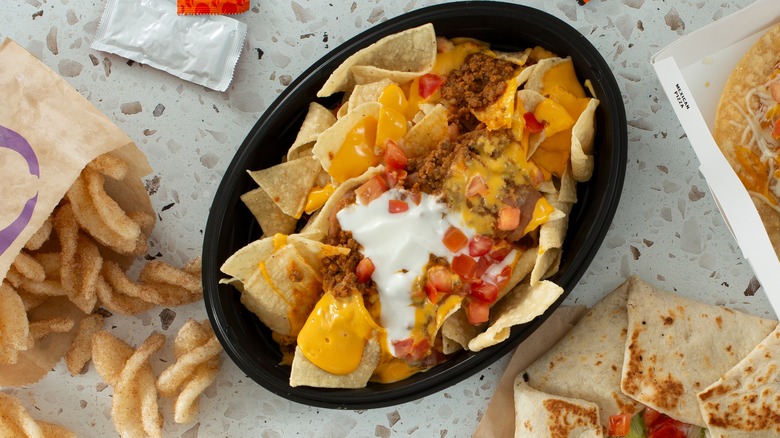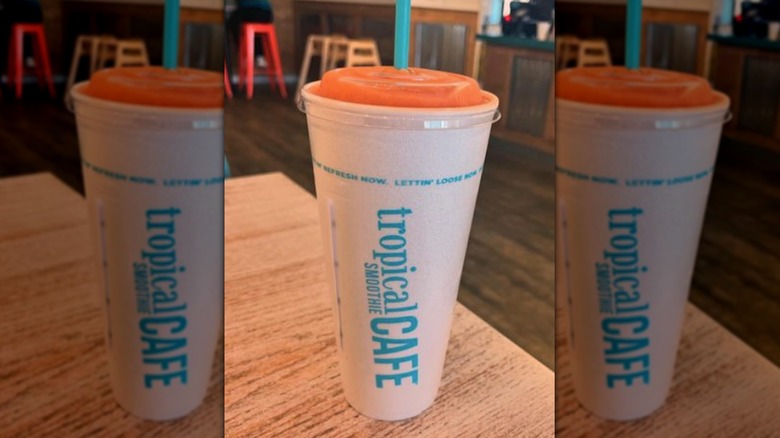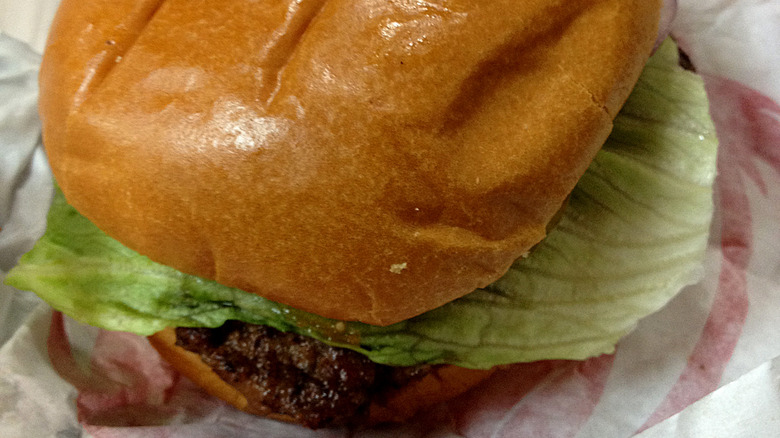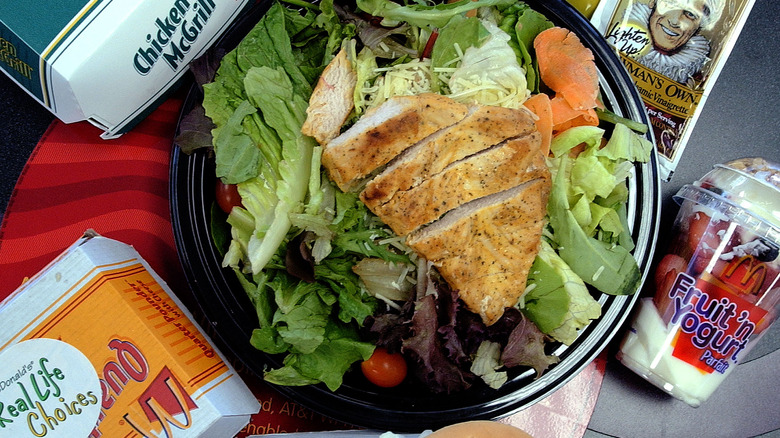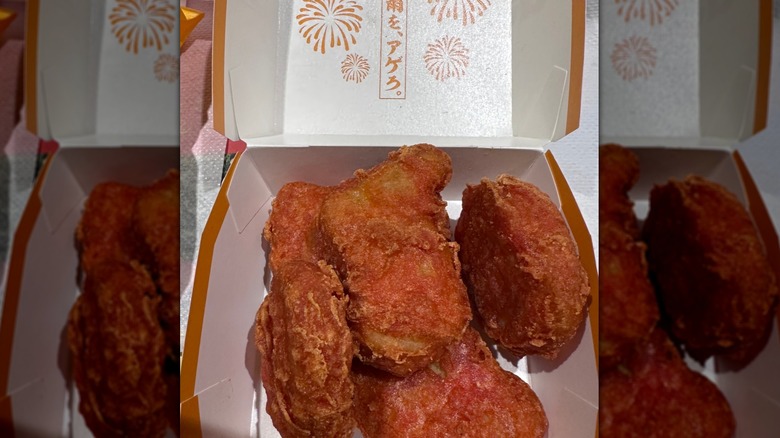Fast Food Recalls That Affected Millions
The United States, and most other nations with a robust economy where fast food took hold and never let go, has a sophisticated food safety program in place to protect citizens against tainted food. Foreign objects, food-borne illness, and other harmful things can very easily find its way into the food supply — particularly in fast-food staples like ground beef, chicken, and vegetables used as toppings — so there are many government agencies and industry watchdogs that thoroughly test raw materials before they're distributed. And yet, despite all those measures and checks, food can still become infected with inedible materials, bacteria, and viruses. The safety measures restaurants neglect the most come into play, too. Usually, after a few unfortunate victims get their meal ruined or get sick (or even sometimes die), fast food companies and their suppliers will spring into action and issue a recall.
Because they all serve so many people on a daily basis, recalls can affect millions of people. Here are some of the biggest, most widespread recalls in fast food history, the result of utter disasters but which happened quickly enough to prevent more chaos and tragedy.
Deadly E. coli in the beef at Jack in the Box
Washington state's Department of Health logged a spike in reported cases in January 1993 among Seattle children of hemolytic uremic syndrome, a blood disorder that causes clotting, diarrhea, and kidney failure. One thing all patients had in common: They'd eaten Jack in the Box hamburgers, from which they'd contracted HUS-causing E. coli, a food-borne bacteria. Within weeks, E. coli infections were noted in Idaho, Nevada, and California, and all 700-plus very sick people had eaten at a Jack in the Box. By the time the outbreak was controlled, with thousands of pounds of infected meat recalled by the company, four children died.
Federal food safety investigators figured out that animal waste had contaminated Jack in the Box's meat supply at one of six slaughterhouses run by the Von Corporation. E. coli present in meat can also be easily killed off by cooking beef at a high enough temperature. In the aftermath of the deadly scandal, several public health departments came forward with evidence that they'd warned Jack in the Box locations to cook meat to an internal temperature of 155 F, while the chain went with the federally-advised heat of 140 F — any higher made them taste unpleasant, customers reportedly said.
Jack in the Box, the fast food chain that everyone now visits at midnight, took a severe hit to business in early 1993. Sales declined by 35% and hundreds of employees were laid off.
Kangaroo and horse in the burger meat at Jack in the Box
Neither the meat of kangaroo or horses is widely eaten or considered acceptable in much of the United States. Not to mention how when people order hamburgers, they're led to believe that they're about to eat just beef. In summer 1981, Jack in the Box participated in a large-scale recall of its beef patties because they weren't entirely made of beef — some kangaroo and horse flesh had gotten into the mix. In the early 1980s, about 7% of American beef was imported, and one of Jack in the Box's suppliers was Profreeze, which sourced much of its product from farms in Australia. Profreeze discovered that some of the meat it had bought and targeted for Jack in the Box's American stores — and already distributed in some cases — contained a fair amount of horse. In Australia, meat inspectors determined that more shipments intended for U.S. restaurants were made up of a mixture of beef and kangaroo meat (which is actually pretty tasty).
The checks came too late; the Department of Agriculture determined that horse and kangaroo had almost certainly been used in Jack in the Box burgers in 1981. To prevent that from happening anymore, the Department of Agriculture seized and prevented from distribution 545,000 pounds of ground beef and patties, all of which tested positive for the presence of horse.
E. coli in the slivered onions at McDonald's
If you ranked every burger on the McDonald's menu, the Quarter Pounder with Cheese would land a high spot. In late October 2024, McDonald's wouldn't allow about 20% of its American locations to sell its signature Quarter Pounder line of burgers owing to a possible E. coli contamination. The Centers for Disease Control linked consumption of that particular sandwich with the 49 people who fell ill with hemolytic uremic syndrome — with symptoms that include diarrhea, vomiting, and stomach cramping — in late September and early October, caused by contraction of E. coli, in 12 states, with the highest concentration of cases noted in Colorado and Nebraska. One person died after eating a Quarter Pounder.
Investigations and lab tests determined that the likely source of E. coli were the slivered onions that McDonald's uses on the Quarter Pounder with cheese and similar sandwiches. The regions experiencing the outbreak were serviced by vegetable processor Taylor Farms. Not only did McDonald's ask hundreds of restaurants to stop serving Quarter Pounders, but Taylor Farms voluntarily recalled all of the onions produced in a specific period of time. The veggie was pulled from many McDonald's as well as Pizza Hut, KFC, Taco Bell, and Burger King outlets. By the time the recall went into effect, 90 individuals in 13 states had become ill. Within a few days of getting the onions out of its network, McDonald's once again started selling the Quarter Pounder.
E. coli in the burgers at Burger King
For a few dicey and potentially dangerous days in 1997, Burger King's name was wholly inaccurate because the chain couldn't sell burgers. About 700 locations in the United States sold primarily BLTs and ham and cheese sandwiches because a large supply of its beef was recalled by supplier Hudson Foods. In June 1997, about 20 people in Colorado contracted the food-borne illness E. coli, and the outbreak was linked to meat processed at a Hudson-controlled plant in Columbus, Nebraska.
In August 1997, Hudson initially pinpointed 20,000 pounds of tainted product, and took them out of the supply line. A day later, it removed another 20,000 pounds of affected product. After inspectors from the USDA arrived for a separate inspection, a total of 1.2 million E. coli-laced beef had been identified, removed, and essentially recalled before it could be distributed. Authorities then discovered that Hudson routinely used older meat, possibly tainting supplies further, leading to a recall of 25 million pounds of beef. In September 1997, a scandal-weathered Hudson was purchased by Tyson Foods. All in all, 1,650 Burger King outlets in 28 states were affected by the recalls in some way.
E. coli in the green onions at Taco Bell
Between November 20 and December 6, 2006, a total of 71 people grew seriously ill after dining at Taco Bell. According to the Centers for Disease Control, those sick with foodborne illness had eaten at various Taco Bells throughout New Jersey, New York, Pennsylvania, and Delaware. Three-quarters needed hospitalization and 11% were diagnosed with kidney failure associated with hemolytic uremic syndrome.
Taco Bell hired an independent laboratory to test its food from the impacted region for the presence of E. coli, but the results pointed to the havoc-wreaking element to be present in the green onions used on some of the chain's menu items. In response, Taco Bell ordered a recall, asking all 5,800-something of its United States outlets to stop using green onions in its daily activities. Public health officials in New Jersey asked Taco Bell to throw away its existing stock and to test its employees for E. coli infection. Taco Bell's decision to get rid of green onions to avoid sickening any more people became a permanent one. As of 2024, Taco Bell still doesn't offer green onions on any of its menu items.
Uninspected beef from sick cows at Jack in the Box and In-N-Out
In January 2008, the Humane Society of the United States released a video purporting to depict evidence of both animal cruelty and unsafe meat processing practices. Footage secretly obtained at a plant operated by the Westland/Hallmark Meat Packing Company in Chino, California, included scenes of employees kicking visibly ill cows and employing forklifts to move animals that couldn't or wouldn't walk into the slaughterhouse. While that's certainly scandalous material, it also represented a possible public health crisis because of the nature of the cows abused. Animals that are unable to walk are known in the beef industry as downer cows, and based on the suspicion of illness like mad cow disease, they must be inspected by a veterinarian before they're allowed to be slaughtered and their flesh enter the food supply.
Just three weeks after the Humane Society's exposé, Hallmark/Westland had ordered a recall of 143 million pounds of beef which had been produced across a two-year span. Most of that meat had been distributed to some very large operations, including the National School Lunch Program and fast food giants Jack in the Box and In-N-Out. The cost of the recall, along with the various fines and costly lawsuits that resulted from the scandal, forced The Hallmark/Westland Meat Packing Company to end operations in February 2008.
Plastic in the chicken at Subway
One of Subway's most enduring and bestselling menu offerings is its Roasted Chicken sandwich. It's made with patties formed out of real chicken breast and rib meat and sent to individual Subway restaurants fully prepared and ready to serve and eat. In 2015, one of Subway's poultry suppliers, West Liberty Foods, worked in tandem with the USDA's Food Safety and Inspection Service to recall a massive shipment of grilled chicken patties distributed to locations in the fast food sandwich chain in Illinois, Oklahoma, Minnesota, Nebraska, and Texas.
After Subway lodged multiple complaints from customers who had discovered pieces of white plastic in their sandwiches made with chicken breast patties, the recall began. Investigators figured out that the compromised meat was all processed at a single West Liberty plant on February 4, 2015 and sent to Subway outlets in 25-pound boxes. The total amount of unsellable, maybe dangerous to consume, and ultimately recalled chicken breast patties: 34,075 pounds.
Metal shavings in the beef at Taco Bell
What's really in Taco Bell beef isn't entirely meat — it's mostly fillers, binders, and seasonings. But while most Taco Bell customers assume the inexpensive product isn't going to be top-notch, they also aren't going to expect to find something inedible and potentially dangerous in an old fave from Taco Bell's Decades menu, or the soft taco or Crunchwrap Supreme. In the fall of 2019, one Taco Bell customer from an undisclosed location complained of finding numerous small pieces of metal in their beef-based meal. The federal USDA-run Food Safety and Inspection Service then fielded complaints about possibly contaminated Taco Bell items from three other diners.
The beef in the affected product was traced back to supplier Kenosha Beef International of Ohio, which had made the meat filling between September 20 and October 4 of 2019. As more metal shavings may have contaminated more food earmarked for the chain, Taco Bell recalled all of the meat processed at Kenosha Beef during that one particular period of time. The total amount of beef recalled was 2.3 million pounds from 21 states. Nobody became sick or injured from the meat, either before or after the recall took place.
Hepatitis in the strawberries at Tropical Smoothie Cafe
In early fall 2016, a moderate outbreak of hepatitis A emerged in several mid-Atlantic states along with a few isolated cases in the South and the West Coast. Over the span of the crisis, 143 people tested positive — of which 56 required hospitalization — for hepatitis A, a contagious disease that affects the liver with symptoms that include yellow eyes and skin, pain in the abdomen, and abnormal bowel movements.
Health departments from the states of those affected, in conjunction with the Food and Drug Administration and Centers for Disease Control, launched an investigation and conducted interviews with some of the patients and found that 129 of 143 people had consumed a product made with strawberries at a Tropical Smoothie Café in Maryland, North Carolina, Virginia, or West Virginia, before August 8, 2016. The ingredient responsible for the illness: strawberries used in many drinks at Tropical Smoothie Café, all of which had been imported from Egypt by the International Company for Agricultural Production and Processing. Tropical Smoothie Café participated in a recall of the Hepatitis A-tainted berries from its East Coast locations and immediately switched to a different strawberry supplier.
E. coli in the lettuce at Wendy's
According to data compiled by the Centers for Disease Control, in summer 2022, there was a rise in cases of E. coli infection across Ohio, Michigan, and Pennsylvania. Initial reports suggested that 37 people fell sick, and that number quickly grew to 109 over six states, with 52 individuals seeking hospitalization for severe GI symptoms. More than 80% of those affected shared a data point: They'd recently eaten at Wendy's restaurants.
Before the CDC could conclusively determine what exactly at Wendy's made everyone get so sick (fortunately, no fatalities were reported), the fast food chain figured out that its lettuce was to blame. Within two days after the first reports of E. coli were filed, Wendy's had stopped using lettuce and recalled the vegetable from its locations in Indiana, Kentucky, Michigan, New York, Ohio, and Pennsylvania.While lettuce was off the menu and out of the kitchen at many Wendy's spots, Consumer Reports advised Americans to avoid anything with the leafy green vegetable at the restaurant nationwide altogether.
Parasites in the salads at McDonald's
A fast food salad is supposed to be the healthier option — a big bowl of vegetables and grilled chicken seems like a solid nutritional choice over chicken nuggets, burgers, and fries. But in 2018, several hundred people became very sick after choosing something supposedly more heart-healthy at McDonald's. In May 2018, reports began to file in to public health agencies about food-borne illness, and over the next two months, the FDA ultimately confirmed more than 500 cases of Cyclospora Cayetanensis, a brutal condition that causes severe gastrointestinal and digestive discomfort.
The parasite enters the body through contaminated water or food, and those who got sick had eaten salads at McDonald's made with a prepared romaine lettuce and carrot blend distributed by supplier Fresh Express. A sample of the carrots used in the blend tested positive for the parasite that causes Cyclospora Cayetanensis, which prompted a recall of salad mix at 3,000 McDonald's restaurants located in 14 states.
Plastic in the McNuggets at McDonald's Japan
U.S.-based fast food companies who do business internationally have borne the brunt of significant and necessary recalls. In January 2015, McDonald's Japan conducted one of the farthest-reaching recalls in contemporary fast food over the back-to-back discoveries of two inedible and reasonably dangerous substances in its product.
First, one customer reported finding small pieces of blue plastic inside their order of Chicken McNuggets. Processed at a facility operated by Cargill in Thailand, that supplier denied responsibility for the compromised McNuggets. McDonald's Japan acted quickly nevertheless, recalling about one million ready-to-eat McNuggets from the Cargill plant before they could be distributed to its restaurants. That recall was completed over the course of one day. Later that same week, another customer at a different McDonald's, in Misawa, Japan, uncovered a different foreign body in their McNuggets. This time, it was a chunk of vinyl material. The previous recall would have caught any more vinyl-laced McNuggets, but to err on the side of caution, McDonald's Japan briefly stopped the sale of all Chicken McNuggets.
